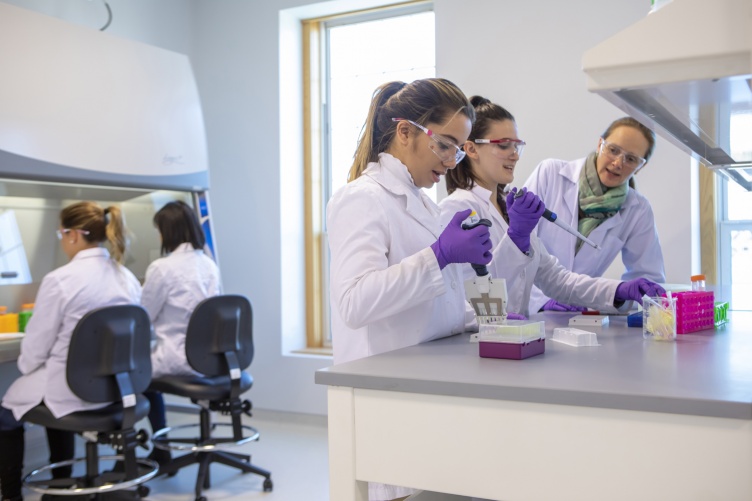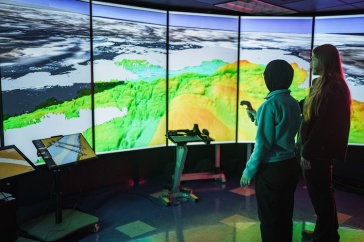
In response to market demand and the growth of its undergraduate program in biotechnology, the University of New Hampshire at Manchester is launching a Master of Science in Biotechnology: Industrial and Biomedical Sciences this fall.
Manchester is at the center of the burgeoning biotechnology industry since the creation of the Advanced Regenerative Manufacturing Institute (ARMI) and its BioFabUSA program, which is creating an industry to regenerate human tissue and organs. As a partner in ARMI’s workforce development initiatives, UNH Manchester is expanding its biotechnology offerings to promote workforce development in this growing field.
“ARMI, BioFabUSA and its member companies are doing a tremendous job driving breakthroughs in regenerative medicine, and it has created a need for skilled workers in the biomanufacturing sector,” says Mike Decelle, dean of UNH Manchester. “The goal of our biotechnology program is to ensure the workforce that is needed for this industry to succeed, which will ultimately have an economic impact on our community and state.”
Recent advances in biotechnology have led to the creation of health care products that fight debilitating and rare diseases, as well as to efforts that reduce our environmental footprint, utilize cleaner energy and create more efficient industrial manufacturing processes. The field has been growing steadily for decades, but the pace has accelerated in recent years with the advent of new technologies like gene editing and biopharmaceutical production. According to research by the Massachusetts Biotechnology Education Foundation, the growth of the industry in the northeast has outpaced the trained workforce—particularly in the area of research and development.
This area of industry relies on applied lab-based skill sets, says Kristen Johnson, assistant professor of biotechnology at UNH Manchester. She says the new master’s program, and the expansion of the college’s laboratory facilities, was designed with that in mind.
“We’ve transformed the entire sixth floor of UNH Manchester into state-of-the-art labs for teaching and research in the areas of biotechnology and cellular biology,” Johnson says. “Students not only get to work with cutting-edge equipment, but they’ll also have opportunities to work with real biotech companies onsite.”
Called the Biotechnology Innovation Center (BIC), UNH Manchester’s sixth floor houses an expansive cell-culture teaching laboratory and extensive space for student research. The BIC also offers rentable incubator space for start-up biotech, pharma and medtech companies, which opens doors to on-site internship, research and cooperative-education (co-op) experiences for students.
Kyle MacLea, associate professor of biotechnology, says the M.S. in Biotechnology: Industrial and Biomedical Sciences emphasizes co-ops, six-month immersive work experiences, as the most significant opportunity for students.
“The best way to prepare students for careers in biotech is to immerse them in industry,” MacLea says. “Co-ops are long-term work experiences that really integrate students into a company, and it is very common for a co-op to lead to full-time employment.”
In addition to industry and laboratory experience, Johnson says the M.S. program focuses on transferable skills that are particularly useful in careers in the biotechnology, biopharmaceutical and regenerative manufacturing sectors.
“Along with laboratory practice, jobs in biotechnology require extraordinary analytical, critical thinking and problem-solving skills,” Johnson says. “Our program puts emphasis on both lab and industry-focused transferable skills, so students are prepared to communicate and collaborate effectively in their chosen field.”
Johnson says students graduate well prepared to meet the projected job growth in biotechnology research and development, medical testing, pharmaceutical and biotech manufacturing, laboratory instrumentation and more.
Designed for working professionals and those with an academic background in biotechnology, biopharmaceutical and regenerative manufacturing sectors, the M.S. in Biotechnology: Industrial and Biomedical Sciences offers part- and full-time enrollment. It is also offered as an Accelerated Master’s Program, which allows qualified UNH undergraduate students to complete a bachelor’s and master’s degree in as few as five years by taking graduate-level classes during senior year. UNH students in the biological sciences, biotechnology and neuropsychology programs in Manchester, a biomedical sciences program in Durham or have proper prerequisite coursework are eligible to apply for the Accelerated Master’s Program.
Learn more about the program online, or contact the UNH Graduate School for more information at unhm.gradcenter@unh.edu or 603-641-4313. Apply by August 1 to be part of the inaugural fall 2020 cohort.
-
Written By:
Kassidy Taylor | Marketing & Communications, UNH Manchester | kassidy.taylor@unh.edu
















































